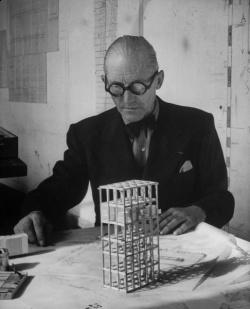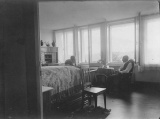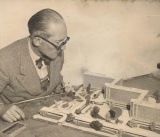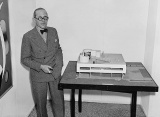Difference between revisions of "Le Corbusier"
Jump to navigation
Jump to search
(→Links) |
|||
| Line 87: | Line 87: | ||
==Links== | ==Links== | ||
* [http://www.fondationlecorbusier.fr/ Le Corbusier Foundation] {{fr}} | * [http://www.fondationlecorbusier.fr/ Le Corbusier Foundation] {{fr}} | ||
| − | |||
[[Category:Architecture|Corbusier, Le]] | [[Category:Architecture|Corbusier, Le]] | ||
Revision as of 11:00, 14 July 2015
 Le Corbusier studying architectural plans and a small model of building in his office, Paris, 1946. | |
| Born |
October 6, 1887 Chaux-de-Fonds, Switzerland |
|---|---|
| Died |
August 27, 1965 (aged 77) Roquebrune-Cap-Martin, France |
| Web | Aaaaarg, Wikipedia, Using "Academia.edu" as base chain is not permitted during the annotation process. |
Charles-Édouard Jeanneret-Gris, better known as Le Corbusier (1887 – 1965), was an architect, designer, painter, urban planner, writer and one of the pioneers of what is now called modern architecture. His career spanned five decades, with his buildings constructed throughout Europe, India, and America.
Selected works
- Villa Fallet, Switzerland, 1905.
- Villa Stotzer, Switzerland, 1907.
- Villa La Roche, Paris, France, 1923.
- Villas at Weissenhof Estate, Stuttgart, 1927.
- Tsentrosoyuz, Moscow, 1928.
- Maison Errazuriz, Chile, 1930.
- Curutchet House, La Plata, Argentina, 1949.
- United Nations headquarters, New York City, 1952.
- Mill Owners' Association Building, Ahmedabad, India, 1951.
- National Museum of Western Art, Tokyo, 1957.
- Philips Pavilion at the World Expositon Brussels, 1958.
- Center for Electronic Calculus, Olivetti, Milan, 1961.
- Church of Saint-Pierre, Firminy, France, designed in 1960, built posthumously and completed under José Oubrerie's guidance, 2006.
Le Corbusier in front of the murals in Villa E1027 he designed for Jean Badovici and Eillen Gray, Roquebrune-Cap-Martin, c1939.
Publications
- Étude sur le mouvement d’art décoratif en Allemagne, 1912. (French)
- as Amédée Ozenfant, Après le cubisme, Paris, 1918. (French)
- Depois do cubismo, trans. Célia Euvaldo, São Paulo: Cosac Naify, 2005, 88 pp. (Brazilian Portuguese)
- Vers une architecture, Paris: G. Crès et Cie, 1923, 230 pp. (French)
- Towards a New Architecture, London: John Rodker, 1931; London: Architectural Press, 1946, OL; Praeger, 1970, OL; New York: Dover, 1986, 320 pp. (English)
- Por uma arquitetura, São Paulo: Perspectiva, 5th ed., 1998. (Brazilian Portuguese)
- Urbanisme, Paris: Crès, 1924, 284 pp. (French)
- Le Ciudad del futuro, trans. E.L. Revol, 1962; 2nd ed., 1972; 3rd ed., Buenos Aires: Infinito, 1985. (Spanish)
- with Paul Otlet and Pierre Jeanneret, Mundaneum, Brussels: Union des associations internationales, 1928, 46 pp. (French)
- Précisions sur un état présent de l'architecture et de l'urbanisme, Paris: G. Crès et Cie, 1930, 268 pp. (French)
- Precisões: sobre um estado presente da arquitetura e do urbanismo, trans. Carlos Eugênio Marcondes de Moura, São Paulo: Cosac & Naify, 2004, 296 pp. (Brazilian Portuguese)
- Quand les cathédrales étaient blanches. Voyage au pays des timides, Paris: Plon, 1937, 325 pp. (French)
- When the Cathedrals Were White, trans. Francis E. Hyslop, Jr., Reynal & Hitchcock, 1947; McGraw-Hill, 1964, 243 pp. (English)
- Cuando las catedrales eran blancas, trans. Julio E. Payró, Buenos Aires: Poseidon, 1948; 2nd ed., 1958, 294 pp. (Spanish)
- with François de Pierrefeu, La maison des hommes, Paris, 1942, 211 pp. (French)
- La Charte d'Athènes, Paris: Plon, 1943, 243 pp; Paris: Minuit, 1957. (French)
- A Carta de Atenas, trans. Rebeca Scherer, São Paulo: IIUCITEC/EDUSP, 1993. (Brazilian Portuguese)
- Les trois établissements humains, Paris: Denoël, 1945, 271 pp. (French)
- Os três estabelecimentos humanos, trans. Dora Maria de Aguiar Whitaker, São Paulo: Perspectiva, 1976; 2nd ed., 1979. (Brazilian Portuguese)
- Le Modulor, Boulogne, 1950; 2nd ed., 1951, 240 pp. (French)
- El Modulor, trans. Rosario Vera, Buenos Aires: Poseidon, 1953; 2nd ed. 1961, 225 pp. (Spanish)
- O Modulor, trans. Marta Sequeira, Lisbon: Orfeu Negro, 2010. (Portuguese)
- Le Modulor II (La parole est aux usagers), Boulogne, 1955, 344 pp. (French)
- Modulor 2, trans. Albert Junyent, Buenos Aires: Poseidon, 1962. (Spanish)
- Entretien avec les étudiants des écoles d'architecture, Paris: Minuit, 1957. (French)
- Mensagem aos estudantes de arquitetura, trans. Rejane Janowitzer, São Paulo: Martins Fontes, 2005. (Brazilian Portuguese)
- Le poème électronique: Pavillon Philips pour l’Exposition Universelle de 1958, Paris: Minuit, 1958, 244 pp. (French)
- La Voyage d'Orient, Paris: Minuit, 1966, 174 pp. (French)
- El Viaje de oriente, 1984; 2nd ed., Valencia: Artes Graficas Soler, 1993, 188 pp. (Spanish)
Collected works
- Le Corbusier: Complete Works in 8 Volumes, Vol. 1: 1910-1929, Vol. 2: 1929-1934, Vol. 3: 1934-1938, Vol. 4: 1938-1946, Vol. 5: 1946-1952, Vol. 6: 1952-1957, Vol. 7: 1957-1965, Vol. 8: The Last Works, eds. Willy Boesiger, Oscar Stonorov and Max Bill, Zurich: Les Éditions d’Architecture, 1930-70, 1708 pp. (French)/(English)/(German)
Literature
- Geoffrey Baker, Le Corbusier: An Analysis of Form, 1984; Taylor & Francis, 1996, 416 pp; 2001.
- Le Corbusier: Analisis de la forma, trans. Santiago Castan, Barcelona: Gustavo Gili, 1985; 6th ed., 1997. (Spanish)
- Jacques Lucan, Le Corbusier: une encyclopédie, Paris: Centre Georges Pompidou, 1987, 497 pp. (French)
- William J.R. Curtis, Le Corbusier: Ideas and Forms, Phaidon, 1994.
- Mardges Bacon, Le Corbusier in America: Travels in the Land of the Timid, MIT Press, 2001, 424 pp. [1]
- Kenneth Frampton, Le Corbusier, London: Thames and Hudson, 2001.
- Carol S. Eliel, Francoise Ducros, Tag Gronberg, L'Esprit Nouveau: Purism in Paris, 1918-1925, New York: Harry N. Abrams, 2001, 192 pp.
- Flora Samuel, Le Corbusier in Detail, Routledge, 2007, 264 pp.
- J. K. Birksted, Le Corbusier and the Occult, MIT Press, 2009, 416 pp.
- Nicola Pezolet, Spectacles Plastiques: Reconstruction and the Debates on the 'Synthesis of the Arts in France, 1944-1962, MIT, 2013. Ph.D. thesis.
- François Chaslin, Un Corbusier, Paris: Seuil, 2015, 517 pp. (French)
- Marc Perelman, Le Corbusier: Une froide vision du monde, Michalon, 2015, 256 pp. [2] [3] (French) Review: Dissidences.
- Xavier de Jarcy, Le Corbusier, un fascisme français, Albin Michel, 2015, 288 pp. (French)
- Joseph Nechvatal, "Revisiting Le Corbusier as a Fascist", Hyperallergic, 10 Jul 2015.
Links
- Le Corbusier Foundation (French)





